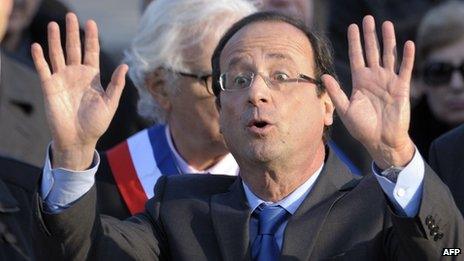Hollande prompts EU austerity rethink
- Published
- comments

Mr Hollande says his first trip will be to see Chancellor Merkel
The ambitions of the French Socialist candidate, Francois Hollande, go beyond France. He is setting himself up as the European champion of growth. He is quite clear: he will not accept German leadership when it comes to the eurozone crisis.
If elected he will be "firm and friendly" with Angela Merkel but "Germany," he said, "must realise it is growth that will allow us to solve a big part of our problem".
Quite simply Mr Hollande believes that Europe is on the wrong path, that "austerity first" is not working; that Europe is being drawn into a spiral of decline. This policy, of course, has "made in Germany" stamped all over it.
Not surprisingly Mrs Merkel is still hoping for a President Sarkozy victory.
'Different kind of Europe'
Mr Hollande wants to renegotiate the pact designed to impose discipline over budgets in the eurozone agreed last December. This treaty - as some call it - dictates that budget deficits must be no more than 3% of GDP by 2013. There will be debt brakes forcing countries to limit their structural deficits to 0.5% of output.
This fiscal pact was Angela Merkel's project to ensure that never again did eurozone countries run up debts and endanger the single currency.
But Mr Hollande is quite clear in his intentions: "I will renegotiate the treaty. Mrs Merkel knows that. And if the French people give me their backing, my first trip will be to confirm to her that the French people have voted for a different kind of Europe."
The words "a different kind of Europe" will not go down well in Berlin. What they imply in undiplomatic language is that German leadership has failed and that it is up to the French to steer Europe in a different direction.
Francois Hollande may have an ally in Mario Draghi, the head of the European Central Bank, external. In the impenetrable language so often loved by central bankers he said that austerity was "starting to reverberate its contractionary effects". In other words, spending cuts and higher taxes are starting to shrink the real economies.
Mr Hollande is committed to balancing the French budget by 2017. He is not intending to renegotiate the fiscal pact itself. After all it would be difficult for the Irish to vote on it at the end of May if it was being re-written. What he wants is for a growth pact to form part of a wider package. Mario Draghi has also backed that.
For the Germans there is a red line: growth cannot be boosted by increasing borrowing. Mrs Merkel believes in structural reforms (freeing up labour markets) to restore competitiveness and eventually increase growth. But structural reforms take time and Europe does not have time.
Franco-German compromise
Francois Hollande backs government bonds jointly issued by all countries that use the eurozone to finance industrial infrastructure projects.
It raises the question of who will select these projects and how long before they have an impact. He wants to use the funds from a financial transaction tax to invest in growth-making projects. And he wants the EU to deploy any unused structural funds in support of growth.
Again, it pays to be cautious: these funds have not always been used wisely.
There may well be a compromise between Angela Merkel and Francois Hollande. Both leaders know that Europe depends on it.
The Franco-German relationship is the engine room of the entire EU project. Mrs Merkel said: "We need growth in the form of sustainable initiatives not stimulus programmes which would increase debts, but growth in the form of structural reform."
The Germans are likely to agree to some growth-boosting initiatives, but get ready for another round of summits that may or may not make a difference.